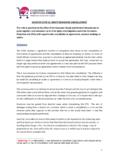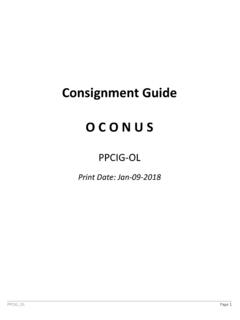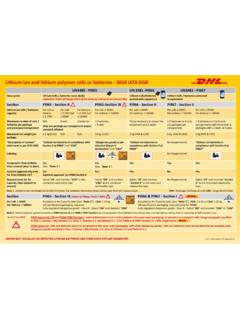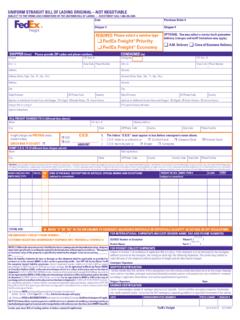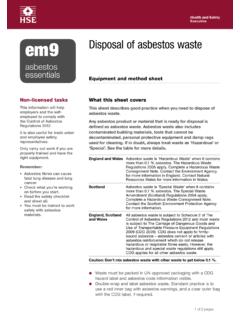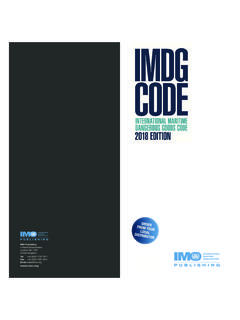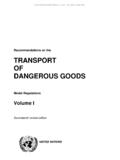Transcription of ADVISORY NOTE 6: CONSUMER’S RIGHTS REGARDING …
1 ADVISORY NOTE 6: consumer 'S RIGHTS REGARDING expiry DATES. This note is provided by the office of the consumer Goods and Services Ombudsman to guide suppliers and consumers as to their RIGHTS and obligations under the consumer Protection Act. Introduction The CGSO has received various claims arising from claimed illness caused by expired foodstuffs, including a claim seeking compensation for a miscarriage and the loss of an RDP. home following an illness allegedly caused by stale crisps. Summary The 'best before' dates are more about quality than safety, except for eggs. So when the date runs out it doesn't mean that the food will be harmful, but it might begin to lose its flavour and texture. 1. It will be noted that none of these definitions state that after such a date , whether Best Before, Sell By, or Use By, the food is unsafe to consume. In fact GNR146 seems to focus on marketability and quality rather than food safety in respect of these durability definitions.
2 2. However, shelf life alone is not an accurate indicator of how long the food can safely be stored. For example, pasteurized milk can remain fresh for five days after its sell-by date if it is refrigerated properly. In contrast, if milk already has harmful bacteria, the use-by dates become irrelevant.[3] According to former UK minister Hilary Benn, the use by date and sell by dates are old technologies that are outdated and should be replaced by other solutions or disposed of altogether.[22] 3. The Norwegian Canning Museum houses tins [of sardines] up to 100 years old that are still edible: See also the ADVISORY Note on Food Poisoning: food%20poisoning% 1. See Annexure B. 2. See Annexure A. 3. See Annexure C. 1. Annexure A. expiry or date of Durability on Foodstuffs and the consumer Protection Act Introduction The consumer Protection Act ( CPA ) provides, amongst others, for a warranty of quality and durablity, the right to safe, good quality goods, warnings concerning the fact and nature of risks associated with goods, safety monitoring and recall of products, and liability for damage caused by goods.
3 It seems likely that the liability for damage caused by goods will have the most far reaching effects on the food industry. This risk is closely linked to the date of durability marked on the food product. In addition to the CPA, the Foodstuffs, Cosmetics and Disinfectants Act ( FCD Act ). 54 of 1972, in Regulation GNR 146 of 1 March 2010 has specific provisions in respect of the date of durability of a foodstuff and the marking thereof. Failure to comply with these provisions may lead to criminal prosecution. The actual date of durability for any foodstuff is however not prescribed and is left up to each manufacturer to determine. Further, the FCD Act makes it a criminal offence to sell or offer to sell any foodstuff which is contaminated or unsafe to eat and inspectors have the power in terms of GNR 328 to order the removal from sale of such contaminated or unsafe foodstuffs. It should however be noted here that a foodstuff that has reached its Sell By , Use By or Best Before date is not automatically considered to be contaminated or unsafe to consume.
4 GNR146 of 1 March 2010 under Act 54 of 1972. The Foodstuffs Act, and in particular R146 provides for the application of a date of durability to food products and in particular: date of minimum durability ("Best Before" or "Best Before End") means the date which signifies the end of the period under any stated storage conditions during which the product will remain fully marketable and will retain any specific qualities for which tacit or express claims have been made, However, beyond the date the food may still be perfectly satisfactory; . " sell by' or display until' means the last date of offer for sale to the consumer after which there remains a reasonable storage period at home; . " Use by' (Best Consumed Before, Recommended Last Consumption date , expiry date ) means the date which signifies the end of the estimated period under the stated storage conditions, after which the product probably will not have the quality attributes normally expected by the consumers and after which date the food should not be regarded as marketable.
5 2. It will be noted that none of these definitions state that after such a date , whether Best Before, Sell By, or Use By, the food is unsafe to consume. In fact GNR146. seems to focus on marketability and quality rather than food safety in respect of these durability definitions. It is illegal to tamper with, change, or in any way alter the date of durability once it has been applied to a foodstuff. However, the actual Best Before , Use By and Sell By dates are not prescribed for any foodstuff the Regulation does not state how long the periods can be, and they are determined by the manufacturer. GNR 328 of 20 April 2007 under the FCD Act Powers and Duties of Inspectors The Regulation provides that an inspector may take a sample for analyses and if it is found to be unsound, seize the foodstuffs in question or order them quarantined pending further investigation. 4(1) An inspector may- (a) if, after an examination of any food contemplated in regulation 2(1)(e) , he or she is satisfied that such food is unsound, or unwholesome or contaminated; or (b) where it appears from the testing or analysis of a sample referred to in regulation 2(1)(f), that the sample or any part of it is unsound, unwholesome or contaminated, by written order in a format provided in Annexure D, signed by him or her, seize the food concerned, or the lot or consignment of food from which the sample was taken if he or she is satisfied that the food in that lot or consignment is in the same condition or possesses the same properties as the sample.
6 There is no reference to dates of durability in the above and the only question is whether the foodstuff is unsound, unwholesome, or contaminated. Liability to a consumer in terms of the CPA. Section 61 of the CPA, which provides for so called no fault liability of the importer, manufacturer, wholesaler, and retailer of unsafe, defective, failed or hazardous goods, or where inadequate instructions or warnings have been provided. Thus, where a consumer purchases a foodstuff marked with a Best Before date and then consumes it after the Best Before date and falls ill, the Best Before date would not be a defence for the retailer or the distributor as the definition of Best Before indicates to a consumer that the foodstuff could still be perfectly satisfactory but may be of reduced quality colour, taste, smell for quite some time and there is no cut off for this period and thus the use of Best Before, although it extends saleability, may leave the supplier exposed to liability under the consumer Protection Act.
7 3. Even the use of Sell By date labelling falls to the same considerations as the Best Before labelling, although to a lesser extent and a consumer would be expected to consume the product within a few days of the Sell By date , although again the exact period is not defined. The lowest risk labelling in terms of durability versus liability is Use By labelling as this clearly indicates to a consumer that the product should be consumed by a certain date although R146 does not make this a requirement for the use of the Use By labelling and this may cause some difficulties to a company trying to rely on this as a defence. Consequences The sword of the consumer Tribunal will hang over the heads of repeat, intentional, or grossly negligent transgressors where a fine of upto 10 % of turnover of a company may be levied. In terms of other provisions there are criminal sanctions against individuals which carry prison terms of upto 1 years.
8 The CPA also puts in place a product recall regime in terms of which product recalls may be ordered by the National consumer Commission for example where foodstuffs have caused illness or other harm. Suppliers are reminded that liability for harm or injury caused by goods introduced under the Act is vastly different from the position prior to the coming into effect of Act in that under the Act the supplier need not have been negligent nor breached an explicit or implied contractual term in order to be liable. Thus the Act imposes a no fault liability on any producer or importer, distributor or retailer of any goods for damage caused wholly or partly as a consequence of supplying any unsafe goods, a product failure, defect or hazard in any goods, or inadequate instructions or warnings provided to the consumer pertaining to any hazard arising from or associated with the use of any goods, irrespective whether the harm resulted from any negligence on the part of the producer, importer, distributor or retailer, as the case may be.
9 The date of durability as discussed above should be viewed as instructions or warnings . in terms of the above. The only defences open to a person in the supply chain alleged to be liable for harm caused to a consumer will be that: (a) the unsafe product characteristic, failure, defect or hazard that results in harm is wholly attributable to compliance with any public regulation;. (b) the alleged unsafe product characteristic, failure, defect or hazard . (i) did not exist in the goods at the time it was supplied by that person to another person alleged to be liable; or (ii) was wholly attributable to compliance by that person with instructions provided by the person who supplied the goods to that person, in which case, subparagraph (i) does not apply;. 4. (c) it is unreasonable to expect the distributor or retailer to have discovered the unsafe product characteristic, failure, defect or hazard, having regard to that person's role in marketing the goods to consumers; or (d) the claim for damages has prescribed in terms of Section 61(5).
10 A further element of liability which is introduced by the CPA is that of no fault vicarious liability in terms of which if an employee or agent of a person is liable in terms of this Act for anything done or omitted in the course of that person's employment or activities on behalf of their principal, the employer or principal is jointly and severally liable with that person. Thus, it would not be a defence for a retailer to claim that the Merchandiser or their supplier had not removed expired stock from the shelf or that the consumer should have seen the Best Before or Sell By date , unless this is accompanied by a suitable warning of the danger of consuming the product after expiry of said date . In addition to any liability under the CPA, the person in charge of premises where unsound, unwholesome, or contaminated foodstuffs were sold can be prosecuted under the FCD Act and be sentenced to a fine or equivalent imprisonment of between 6 and 24 months, depending on whether it is a first offence or not.
